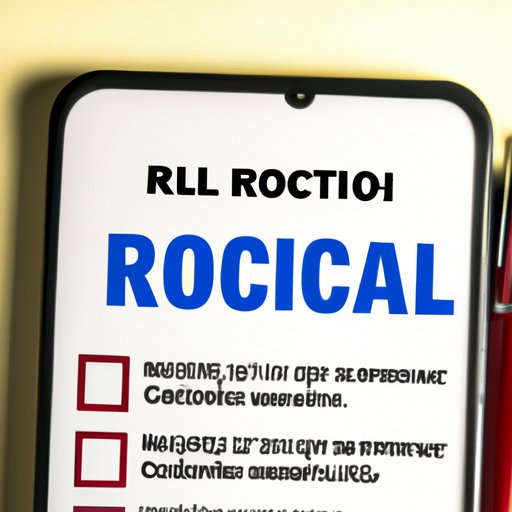Introduction
Recording phone calls is a common practice used by businesses, journalists, parents, and more. But is it illegal to record a phone call? This article will explore the legality of recording phone conversations, as well as the potential risks and rewards involved.

Exploring the Legality of Recording Phone Calls in Different Jurisdictions
The legality of recording phone calls varies from jurisdiction to jurisdiction. To gain a better understanding of the laws surrounding this activity, let’s take a closer look at federal and state laws on recording phone calls.
Overview of Federal Laws on Recording Phone Calls
Under federal law, it is generally legal to record a phone call or conversation so long as one party (including you) to the conversation consents. This is sometimes referred to as the “one-party consent” rule. However, there are some exceptions to the one-party consent rule, such as when a person has a reasonable expectation of privacy. Thus, if you intend to record phone calls, it is important to check your local laws to ensure that you’re not violating any applicable statutes.
Review of State Laws on Recording Phone Calls
In addition to the federal law discussed above, many states also have their own laws governing the recording of phone calls. These laws vary greatly from state to state. For instance, while some states require only one-party consent, others require all parties to a conversation to provide consent before a call can be recorded. Additionally, certain state laws may prohibit the recording of certain types of conversations, such as those involving medical or financial matters.

Examining the Laws Surrounding Recording Telephone Calls
When it comes to recording telephone calls, the most commonly discussed rule is the two-party consent rule. This rule requires all parties to a telephone call to provide consent before it can be recorded. While this rule is often thought to apply in all states, the reality is that only 12 states currently have two-party consent laws in place. These states are California, Connecticut, Florida, Illinois, Maryland, Massachusetts, Michigan, Montana, Nevada, New Hampshire, Pennsylvania, and Washington.
Overview of the Two-Party Consent Rule
Under the two-party consent rule, both parties to a telephone conversation must provide their consent before a call can be recorded. If one party does not give their consent, then the recording is considered illegal and could potentially lead to criminal or civil penalties. Additionally, if the recording was made without the knowledge of either party, then it is likely to be deemed unlawful.
Discussion of Exceptions to the Two-Party Consent Rule
There are several exceptions to the two-party consent rule. For instance, some jurisdictions allow recordings made in the course of business or with the intention of documenting evidence of a crime. Additionally, many jurisdictions recognize that recordings made in public places, such as parks or streets, are generally permissible as long as no other parties are present. Finally, some jurisdictions allow for recordings made for journalistic purposes, provided that the recording does not violate any other laws.
Understanding the Risks and Rewards of Recording Phone Calls
Although recording phone calls can be a useful tool for businesses and individuals, it is important to understand the potential risks and rewards associated with doing so. Let’s take a closer look at both sides of this equation.
Outlining the Potential Consequences of Recording a Phone Call Without Permission
If you record a phone call without the consent of all parties, you could face serious legal consequences. Depending on the jurisdiction, you could be subject to criminal or civil penalties, including fines or even jail time. Additionally, you could be sued for damages by the other party if they were unaware that the call was being recorded.
Discussing the Benefits of Recording Phone Calls With Permission
On the other hand, recording phone calls with the permission of all parties can be extremely beneficial. For example, businesses can use recordings to document customer service issues, protect themselves from liability, and train staff members. Additionally, recordings can be used to provide evidence in court proceedings or to settle disputes between parties.
The Do’s and Don’ts of Recording Phone Calls: A Legal Guide
To ensure that you remain within the bounds of the law when recording phone calls, here are some do’s and don’ts to keep in mind.
Exploring Best Practices for Recording Phone Calls
First and foremost, always obtain permission from all parties before recording a phone call. Additionally, make sure to inform all parties that the call is being recorded and to keep a record of this notification. Finally, store all recordings in a secure location and delete them once they are no longer needed.
Outlining How to Avoid Legal Risks When Recording Phone Calls
It is also important to avoid recording phone calls in situations where it is illegal to do so. This includes recording calls in states with two-party consent laws, as well as calls in which one or more parties have a reasonable expectation of privacy. Additionally, it is important to avoid recording calls that involve sensitive topics, such as medical or financial matters.
Conclusion
Recording phone calls can be a useful tool for businesses, journalists, and individuals. However, it is important to understand the legal implications of recording phone conversations, as well as the potential risks and rewards involved. To stay on the right side of the law, it is important to obtain permission from all parties before recording a call and to follow best practices for storing and deleting recordings. By following these guidelines, you can ensure that your recordings are legal and compliant with applicable laws.


